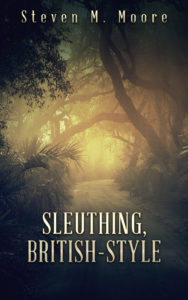Sleuthing, British-Style…
 Yes, this is the title of three short-fiction collections, one published (even appearing on Amazon!) and two free PDF downloads (see the “Free Stuff & Contests” for these and other freebies). Here though, I’m referring to the necessary ingredients a British-style mystery, crime story, or police procedural must have (perhaps seasoned with a bit of dry Irish humor?).
Yes, this is the title of three short-fiction collections, one published (even appearing on Amazon!) and two free PDF downloads (see the “Free Stuff & Contests” for these and other freebies). Here though, I’m referring to the necessary ingredients a British-style mystery, crime story, or police procedural must have (perhaps seasoned with a bit of dry Irish humor?).
A body. One might not be necessary, but it’s helpful. It might not appear early on either, depending on whether the victim is a toff or common yob (for the terms, see the above collections), i.e., how it appears might have a lot to do with how the author wants you to feel about the victim. Does the victim deserve their fate? If that’s the author’s intention, they’re still expecting the reader to stick with the investigation long enough to find the culprit and send him to the gallows (older mysteries) or life in the king’s boarding houses (AKA gaol in modern Britain).
A new type of crime? This is difficult. Human beings are inventive, and criminals aren’t as dumb as the police would like them to be, but the most types have been around for a while. The new wrinkle might result when a common but lesser crime, not murder, occurs, or from the various classic motivations of greed or jealousy going out of control. Of course, the new wrinkle might also be found in the person committing the crime, not the crime itself.
The investigation. This is where the detective brilliantly (with ups and downs, of course) battles wits with the culprit or culprits. The investigation is most of the plot, of course, and it might have many twists and turns, all to challenge the detective. They might be an amateur, like Miss Marple—mostly in cozies nowadays—or shrewd professionals who are more clever and inventive than any mathematician because they’re practical and understand human failures.
The interrogation. This is the ubiquitous battle of wits that has mostly replaced the classic Christie-style denouement where all the details of the crime come to light. As such, it’s a lot more interesting. The main character can lose the case or cleverly win it. (The first often occurs a few times as the author presents several attempts by the detective to trap the criminal, catching them in some contradiction or lie. It also provides a great opportunity for witnesses, good or bad, to mislead the detective in the wrong direction!)
American mystery writers’ creations often fail in comparison to British-style mysteries simply because they’re more dependent on action scenes than witty confrontations. One exception is an author who’s better known for his sci-fi than for mysteries: Isaac Asimov was a fan of cerebral mysteries and wrote a few. His main character, Earthman Elijah Bailey, is a futuristic Poirot, a master in trapping the criminal with clever interrogations. Asimov created the subgenre of sci-fi mystery, and no since can compare with his creations in that subgenre.
***
Comments are always welcome. (Please follow the rules on the “Join the Conversation” web page.)
Dr. Carlos, Chief Medical Officer. This free PDF download collects together most of my short stories involving Carlos Obregon. While some are standard sci-fi thrillers, there are sci-fi mysteries too. (I also have a few other sci-fi mysteries, and I’m working on a full novel.) The reader may consider all these tales as homages to Isaac Asimov. (I read his The Naked Sun before any of his other novels!)
Around the world and to the stars! In libris libertas!
